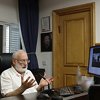 It is written that the Creator hardens the heart of Pharaoh, that is, the egoistic desire to enjoy. It is necessary to isolate and increase it so it will become obvious who your enemy is on your way to the Creator, identify it, then turn it from the evil Pharaoh into the good Creator, and thus reach adhesion with the upper force.
It is written that the Creator hardens the heart of Pharaoh, that is, the egoistic desire to enjoy. It is necessary to isolate and increase it so it will become obvious who your enemy is on your way to the Creator, identify it, then turn it from the evil Pharaoh into the good Creator, and thus reach adhesion with the upper force.
There is no servant more faithful to the Creator than Pharaoh who is summoned to bring us to the Creator so that we will be able to distinguish between light and darkness, bestowal and reception, sweet and bitter. With the help of Pharaoh, we learn how to reach the qualities of the Creator. Ultimately, the Creator hardens the heart of Pharaoh, that is, He is behind everything, even the events that are most unpleasant for us. “There is none else besides Him” in the entire reality.
If we are able to accept that all forces of nature, all human beings, all hostile actions, and all thoughts come from the Creator and we want to come to love Him, then we turn all these adverse means into help.
We can only discern any quality through the contrast of opposites, not by itself. We are created beings and we must feel both ourselves and the Creator. The gap between these two sensations gives us the feeling of reality.
The more we differ from the Creator, the deeper and more accurately we can reveal Him, on a more inner level. Therefore, it is said that the greater a person is, the greater is his egoism. The further we advance, the more serious disturbances we encounter, and, at the same time, the collision of opposites helps us come to the conclusion that “There is none else besides Him.”
Our entire work is in establishing the uniqueness of the upper force, nothing besides it exists. The whole world is comprised of disturbances from the force that opposes the Creator, called “the Pharaoh.” Over all this confusion created by the Pharaoh, we can establish that it was sent by the Creator. Then all the disturbances become enveloped in “There is none else besides Him,” and we can examine this principle more accurately in all its detail by building the image of the Creator through the image of the Pharaoh.
We have no way to approach the Creator who has no image. However, it is the disturbances that build the image of the Creator in the inverse form for us.1
Pharaoh confuses us throughout our lives until the day we die, forcing us to think that our duty is to serve egoism. We are not even slaves, but voluntary workers, of Pharaoh, ready to carry out all the orders of our nature in order to receive pleasures in return, or at least to avoid suffering. However, if the Creator wants to bring a person closer to Him, he hardens his heart, showing him that he is working for the evil force, for Pharaoh, who does not care about a person’s welfare, but deceives one throughout one’s life in order to eventually bury him in the ground. Pharaoh enjoys the fact that we are following his orders.
However, the good force is hiding behind the evil one and wants to teach us the advantage of light over darkness by showing us through these opposites that there is something above our nature. All this is so that we, through our desires and efforts, will discover this upper reality, the spiritual world, by ourselves, and come to recognize the upper force that is above Pharaoh. This is how we reveal the opposite form of Pharaoh—the Creator.
Afterward, we chase “none else besides Him,” looking not at Pharaoh himself, but trying to see the Creator through him. Let Pharaoh play any role before me, the main thing is that he helps me reveal various forms of the Creator’s attitude toward me.
The Creator is a permanent, unconditional, invariable good that I cannot see. The upper light even now fills all of reality, but who sees it? Pharaoh gives me a transparent negative through which I look at the light and see all kinds of images. I will not be able to understand and distinguish anything in the Creator if it were not for Pharaoh.
The crueler Pharaoh becomes, the more contrasting details we can reveal in the Creator. Without Pharaoh there is no Creator; therefore, the Creator initially created the evil inclination. When we look at the Creator through our evil inclination, we can see all kinds of forms, types of relationships, actions, and intentions, and with the help of Pharaoh, we learn how to become similar to the Creator.2
From the 1st part of the Daily Kabbalah Lesson 4/24/19, Pesach (Passover)
From the 1st part of the Daily Kabbalah Lesson 4/24/19, Pesach (Passover)

No comments:
Post a Comment